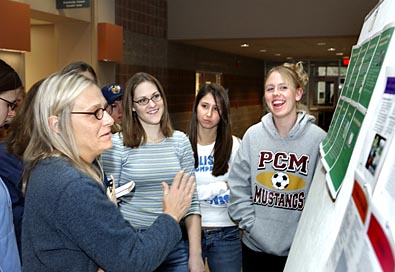Inside Iowa State | ||
Inside ArchivesSubmit newsSend news for Inside to inside@iastate.edu, or call (515) 294-7065. See publication dates, deadlines. About InsideInside Iowa State, a newspaper for faculty and staff, is published by the Office of University Relations. |
December 10, 2004 Science, activism meet in SENCERIn 33 teams, about 200 students in Barbara Krumhardt's Biology 201 section presented poster sessions this week as part of the environment awareness component of the course. Each team identified environmental issues on campus -- cigarette butt litter, excessive electricity use in the residence halls, can and bottle recycling, food waste in the new dining center on Union Drive, invasive plants in the prairie behind Science II, for example -- studied the problems and made recommendations to remedy them. The exercise was the pilot project at Iowa State of a national effort to improve undergraduate science education by asking students to work through civic challenges -- including environmental issues or something as large and complex as HIV/AIDS. 
Barb Krumhardt (left), genetics, development and cell biology, visits with a Biology 201 student team during a poster session this week. Photo by Bob Elbert. The program is known as SENCER (Science Education for New Civic Engagements and Responsibilities). It's sponsored by the National Science Foundation, and housed at the National Center for Science and Civic Engagement at the new Harrisburg University of Science and Technology. Program goals are to:
"The SENCER component was a small piece of what they did this semester, but by focusing on issues at Iowa State, I'm hoping they get a feeling of ownership of their campus," Krumhardt said. Krumhardt is one of six faculty and a graduate student who represented Iowa State at a SENSER institute last summer. At the institute, teams began to develop course materials to teach science through unsolved public issues that require scientific knowledge and expertise. Joining her were Jean Goodwin, English; Jim Pease, Steve Jungst and Lita Rule, natural resource ecology and management; and Sarah Franklin, a graduate teaching assistant in natural resource ecology and management (NREM). The team leader is Jan Thompson, NREM associate professor. The national SENCER efforts "are aligned very strongly with what we know is effective in enhancing college students' learning and retention," Thompson said. "And, we're trying to get our students to insert themselves into public conversations and think about issues, and to become part of a public that is not so apathetic." SENCER this springFaculty have been preparing materials for two spring courses: an introductory animal ecology course for non-majors that will include debate about a current issue involving animals (effects of widespread development on Florida's panther population is one), and an argumentative writing course in which students will study and take sides on science-based issues. |
SummaryIowa State students are participating in a pilot project for a national effort to improve undergraduate science education by asking students to work through civic challenges -- including environmental issues or something as large and complex as HIV/AIDS. |
|
Ames, Iowa 50011, (515) 294-4111. Published by: University Relations, online@iastate.edu. Copyright © 1995-2004, Iowa State University of Science and Technology. All rights reserved. |
||